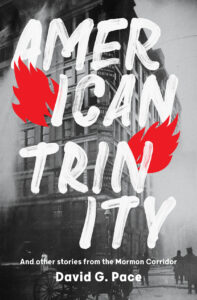Review
 Title: American Trinity: And Other Stories from the Mormon Corridor
Title: American Trinity: And Other Stories from the Mormon Corridor
Author: David G. Pace
Publisher: BCC Press
Date: 2024
Pages: 216
ISBN: 978-1961471023
Reviewed by Doug Gibson
I really enjoy reading fiction by David G. Pace. He often captures the conflict between traditional Mormonism, its cultural comfort level, and inevitable questioning and repudiation of mores necessary in a changing world. In Pace’s work, this conflict, if continued, can irreparably damage a marriage, cause a general authority to want to rebel, or lead one of the Three Nephites to be fed up with Christ for giving him a never-ending gospel calling.
That leads to the signature story, “American Trinity,” in this new anthology, published by BCC Press. Zed is one of the Three Nephites, and the endless stretch of time, the constant changing of environments and culture, have him burnt out, to put it mildly. He only has occasional contact with the other two Nephites, and spends a lot of time at the theater. One of the Three Nephites, Jonas, has become of the world, enjoying multiple marriages and children that he outlives. The other, Kumen, goes the other way, living nomadic and looking for little, mundane miracles he can give to Saints. They are the kind of miracles tailor made for a Fast Sunday sacrament meeting.
I was enjoying the story, Zed’s history and his anguish, and expected it to just end, with Zed facing another day. And then wordsmith Pace ups the ante and provides a powerful climax that near brought me to tears. Our protagonist comes across the Triangle Shirtwaist Factory fire, in Greenwich Village, on May 25 1911. Zed comes to a 12-year-old girl, who jumped out to escape flames. She’s dying. He can’t help her. But somehow this brave soul accepts her death, and — at least for a little while — saves Zed. “‘Don’t be afraid,’ she told him.”
There are 12 stories in the anthology. Some I particularly enjoyed were “City of the Saints,” a Babbit-esque tale of a recently called lesser LDS general authority trying to assert himself and resist conformity. Another, “Sagarmatha,” involves a disaffected Latter-day Saint man escaping his crumbling marriage by traveling to Nepal on a mountain-climbing trek. While on it, he devotes considerable energy to protecting a sick dog.
“Caliban Revels Now Ended” is a well-crafted story of a missionary, with his companion, who read The Book of Mormon to a stroke victim, Ian, who cannot talk to them. “There was something about reading the verses aloud–the way they filled the old house with an authoritative cadence–that conjured for Ethan an assurance he hadn’t felt before: that the book was a good one; that it was speaking to him,” Pace writes. The story concludes 20 years later, with Ethan no longer an orthodox Mormon, no longer a believer in the Book of Mormon as fact. Yet Pace writes, “Still, as Ethan drove away that summer night, he hoped that someone had read one of the final passages of the Mormon’s book to Ian before he passed on–a passage that, to Ethan seemed to transcend both orthodoxy and disbelief.”
I see through the stories a respect for the Book of Mormon, not as a factual tome, but as a book, created by a man with talents, that can change the lives of individuals. In “American Trinity,” Zed reiterates his deep affection for the Book of Mormon as a history that survived, although he is disappointed at Mormon’s excessive abridgment.
A couple of others stories I particularly recommend are “Stairway to Heaven,” for its take on how surprising too-soon death can be interpreted within LDS culture, and “The Mormon Moment,” a lighthearted yet insightful tale — told in quotes — of an older LDS man trying to convince “Dot” to vote for Mitt Romney over Barack Obama. It reminded me of the culture of 2012, only 12 years ago but it seems like a long time. Frankly, I’d like to see Pace capture this subject with Donald Trump in 2024.
Buy this anthology, and also pick up Pace’s novel, Dream House on Golan Drive. It’s an excellent read of a Utah Mormon family in the 1970s, and the novel’s narrator is “Zed” of the Three Nephites. I’ve no doubt Zed’s still around today, hoping against hope for Christ’s Second Coming, and an end to his calling.
